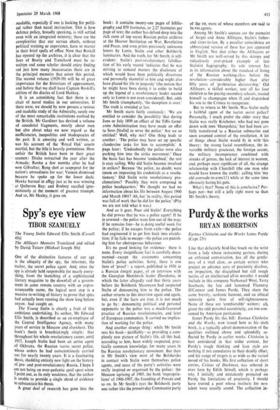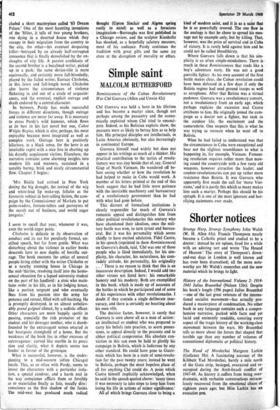Purdy & the works
BRYAN ROBERTSON
Eustace Chisholm and the Works James Purdy (Cape 25s) Like that delicately bird-like touch on the Wrist from a lady whose restraining gesture, during an enforced conversation, has all the gentle- ness of a steel claw, so certain writers who project an advance aura of preciosity disclose, on inspection, the disciplined but still rough tactics of an intellectual all-in wrestler. I would include in this company Nathanael West, Terry Southern, the late and lamented Flannery O'Connor and James Purdy. They share the same brevity, sardonic humour, and an ethical intensity quite free of self-righteousness. None of these are `comfortable' writers: all, given the odd personal eccentricity, are too con- sumed by American puritanism.
James Purdy fits this bill : Eustace Chisholm and the Works, now issued here as his sixth book, is a typically adroit demonstration of the qualities outlined above and splendidly re- flected by Purdy in earlier works. Chisholm is best considered in that wider context, for Purdy's tough thinking and lean style are nothing if not cumulative in their deadly effect, and his range of targets is as wide as the varied mood of his books. His first collection of short stories, Colour of Darkness, was ushered in over here by Edith Sitwell, which is perhaps why I initially and mistakenly projected on Purdy the limitations of preciosity. I shoUld have trusted, a poet whose instincts for new talent were usually sound. The collection in- eluded a short masterpiece called '63 Dream Palace.' One of the most haunting inventions of the 'fifties, it tells of two young brothers, one dying in a deserted house which they occupy in their migration from the country to the city, the other—his eventual despairing killer—betrayed by an already half-corrupted innocence that is finally demolished by the on- slaughts of city life. A passive confidante of the second brother is a becalmed writer, picked up in a park; the same device-rOle is more equivocally, and certainly more full-bloodedly, played by the failed writer, Eustace Chisholm, in this latest and full-length novel. Chisholm also learns the circumstances of violence flickering in and out of a circle of acquaint- ances, and the eventual, explicit outrage and death endured by a central character.
In between, Purdy has made successful forays in different directions, though outrage and violence are never far away. It is necessary to stress Purdy's wild humour, which flows at its best in his last novel but one, Cabot Wright Begins, which is also, perhaps, his most enjoyable because most integrated as well as complex work. Outrage here is positively hilarious, in a black sense, for the hero is an insatiable rapist with a nice line in chatting up his dazedly acquiescent victims. Elsewhere, the narrative contains some alarming insights into modern life and manners, sustained in a notably barmy, brisk and nicely circumstantial flow. Chapter 5 begins: 'Mrs Bickle had arrived in New York during the big drought, the revival of the wig and white-lead lip make-up, fellatio as the favourite subject in best-selling fiction, the cam- paign by the Commissioner of Markets to put palm-readers, fortune-tellers and purveyors of the occult out of business, and world sugar irregular.'
I seem to recall that year, whenever it was, even the world sugar panic.
Chisholm is delicate in its observation of conduct and its ear for peculiarly formal, un- stilted speech, but far from gentle. What was disturbing about the violence in earlier books descends here to new depths of horrific out- rage. The book recounts the antics of several people living either with the writer Chisholm or at a nearby rooming house in Chicago in the mid-'thirties, resolving itself into the homo- sexual obsession for a lapsed university student on the part of his landlord: a stoic who main- tains order in his life, as in his lodging house, like a puritan sergeant and who eventually flees from his passion into the army for penance and retreat, filled with self-loathing. He is promptly destroyed, in an almost unbeliev- ably grand guignal climax, by a sadistic officer. Other characters are more happily spotlit in passing, especially the rich protector of the student and his dowager mother, who is dumb- founded by the extravagant scenes enacted in her bourgeois stronghold of a home. But the weakness of the book lies in other excesses of extravagance: carved like marble in its preci- sion and clarity, what it depicts seems too loaded in favour of the grotesque.
What is successful, however, is the under- pinning to a mid-western (often Chicago) locale. This, as so often with Purdy, seems to invest the characters with a particular isola- tion, a special candour, and a harsh zeal in the way conscience afflicts them so forcibly as to materialise finally as fate, usually dire: conscience as the first shadow of the furies. The mid-west has produced much radical thought (Upton Sinclair and Algren spring easily to mind) as well as a ferocious imagination—Burroughs was first published in a Chicago review, and the sculptor Kienholtz has shocked, as a hopefully salutary measure, most of his audience. Purdy continues the tradition with great gifts and the same icy stare at the disruption of morality or ethics.







































 Previous page
Previous page